
Music / “Vietnam Requiem”, conducted by Christopher Latham. At Llewellyn Hall, ANU, until June 6. Reviewed by CLINTON WHITE.
CHRISTOPHER Latham’s “Vietnam Requiem” was a triumph and quite possibly the most moving concert performance this writer has ever attended.
Latham compiled the work from compositions from a range of composers, rather than it being written as a single work by one composer. This might seem strange, but Latham has proven this formula to work successfully; he took a similar approach for his “The Diggers’ Requiem” of 2018, which attracted worldwide acclaim.
Latham gathered and conducted huge forces, including some stars of the Vietnam era, for this three-hour epic, divided into two contrasting but complementary “Acts”, and embellished it with a comprehensive and beautifully presented program booklet.
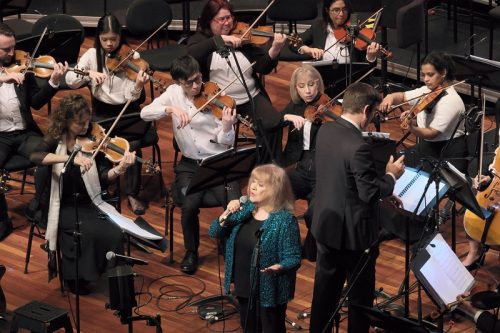
With a three-piece contemporary band comprising Bill Risby (piano and keyboards), Ben Hauptmann (guitar) and Warren Trout (drums) with a chamber orchestra mainly of strings, the first act comprised 12 songs inextricably linked to the period of Australia’s involvement in the Vietnam war.
And to perform those songs was a who’s who of the ’60s and ’70s, including Normie Rowe, Little Pattie, and NZ-born singer Mark Williams, along with John Schumann, of Redgum fame, jazz singer Nina Ferro, and Vietnamese singer Phan V?n H?ng.
Songs such as “He Ain’t Heavy, He’s my Brother”, “I Was Only 19”, “Smiley” and “What a Wonderful World” no doubt brought back memories for many.
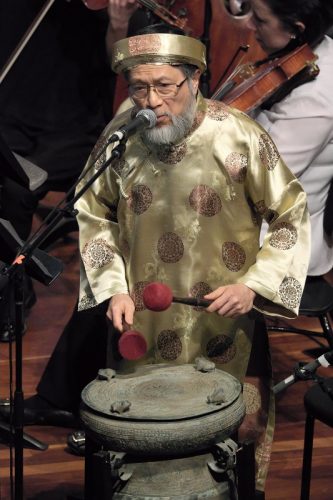
Phan V?n H?ng’s story is especially interesting. He and his family escaped Hanoi in 1954, when he was four years old.
By 1982 he was married and came to Australia as a refugee. He became well-known in both Vietnam and Australia for his songs about the harrowing stories of people’s suffering in Vietnam.
His two songs, sung in Vietnamese, “The Little Girl and the Pebbles” and “Return to Galang”, the English lyrics of which are in the program booklet, were beautiful and poignant. In the case of “Return to Galang”, the poignancy was made especially so by a gorgeous accompaniment on cello by CSO principal Patrick Suthers.
The second act comprises an overture and 12 movements, each accompanied on two large overhead screens by thoughtfully presented historical facts and figures as well as images. They were not meant to be presented chronologically, but more to tell the story behind each movement.
The work’s movements were written by the cream of Australian composers – Peter Sculthorpe, Ross Edwards, Graeme Koehne, Andrew Schultz, Elena Kats-Chernin, and Latham himself. Even works by overseas composers were included.

There was a stellar cast of soloists, too – Phan V?n H?ng, dressed in a magnificent gold traditional costume and playing a 2000-year-old Vietnamese ?ông S?n bronze drum, didgeridoo virtuoso William Barton, trumpeter Paul Goodchild, guitarists Minh Le Hoang and Slava Grigoryan, sopranos Susannah Lawergren and Rachel Mink, soundscape technician Bob Scott, and harpist Alice Giles.
They were supported by the Canberra Symphony Orchestra and guest instrumentalists, led by concertmaster Kirsten Williams, as well as members of military bands and several choirs.
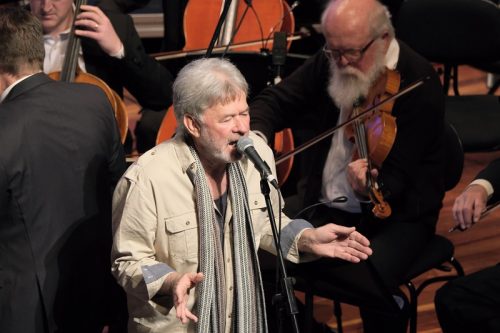
In all, more than 200 artists performed the work. So many musicians were on stage that Latham’s conductor’s podium was on its own platform in front of the stage.
Space does not allow discussion of all 13 movements, but a couple particularly are worth mentioning.
The Overture, “The Cold War”, a Latham arrangement of “The Time of War”, by US composer Caleb Burhans, began with single strokes on the ?ông S?n drum, slowly building in volume and intensity, with William Barton joining in on didgeridoo and Slava Grigoryan on guitar. The ancient and the modern coming together in this way created an ethereal, almost mysterious, beginning.
Movement 8, “The Entertainers”, was a Bill Risby arrangement of two songs into a medley, Carole King’s “You Make Me Feel Like a Natural Woman” and “(Sittin’ On) The Dock of the Bay”, by Otis Redding and Steve Cropper.
Nina Ferro sang the medley in honour of Cathy Wayne who was shot and killed by a US marine at the end of her performance at a US Marine NCO’s club on a base near Da Nang (the shooter possibly intended the shot for the CO, but missed). She was the first Australian woman to be killed in Vietnam. She … was only 19.
Movement 11, “The Boat People”, by Graeme Koehne, brought home the plight, not only of Vietnamese refugees in the ’70s and ’80s, but perhaps also suggested a sub-text relevant to today’s refugees.
Movement 12, Latham’s “The Road to Peace”, concluded with a deeply emotional “Last Post” played variously on harp and guitar with the didgeridoo quietly and respectfully providing a foundation, with gentle punctuation from the ?ông S?n drum.
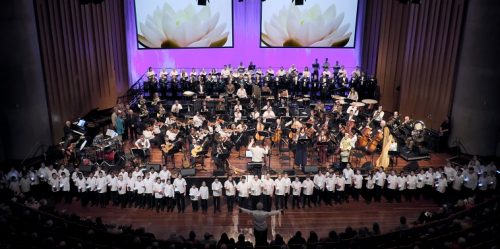
At the conclusion, there was a long silence, seemingly for at least 45 seconds, with no-one in the audience daring even to breathe, and Latham still facing the orchestra.
I wanted the silence to continue. But, from the back of the capacity house came soft, gentle applause. As it built in volume on its way to the front, so did the audience rise to a standing ovation for a truly magnificent performance, put together by Christopher Latham and a vast team of helpers. It thoroughly deserves to be kept “on top of the desk and dog-eared” for performances in the future.
Who can be trusted?
In a world of spin and confusion, there’s never been a more important time to support independent journalism in Canberra.
If you trust our work online and want to enforce the power of independent voices, I invite you to make a small contribution.
Every dollar of support is invested back into our journalism to help keep citynews.com.au strong and free.
Thank you,
Ian Meikle, editor

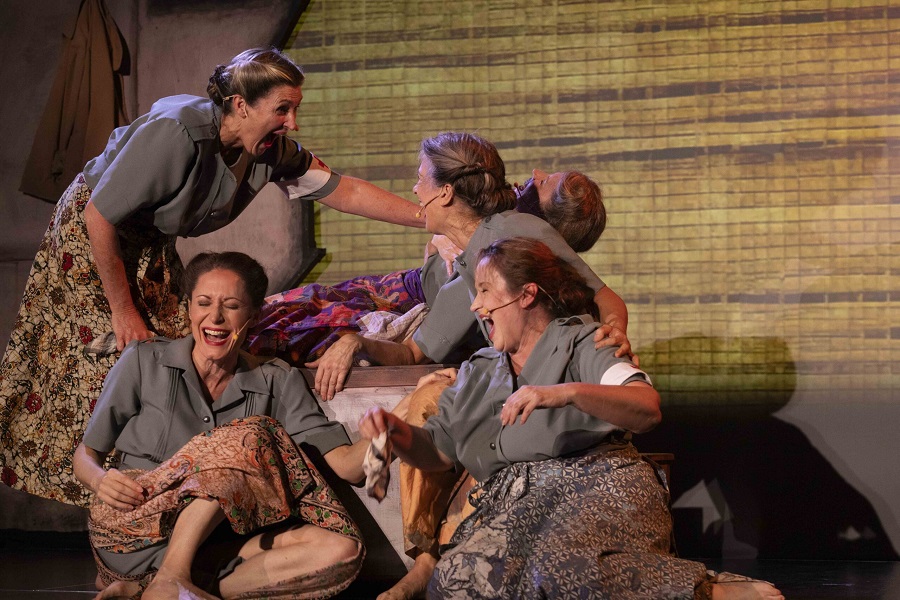






Leave a Reply